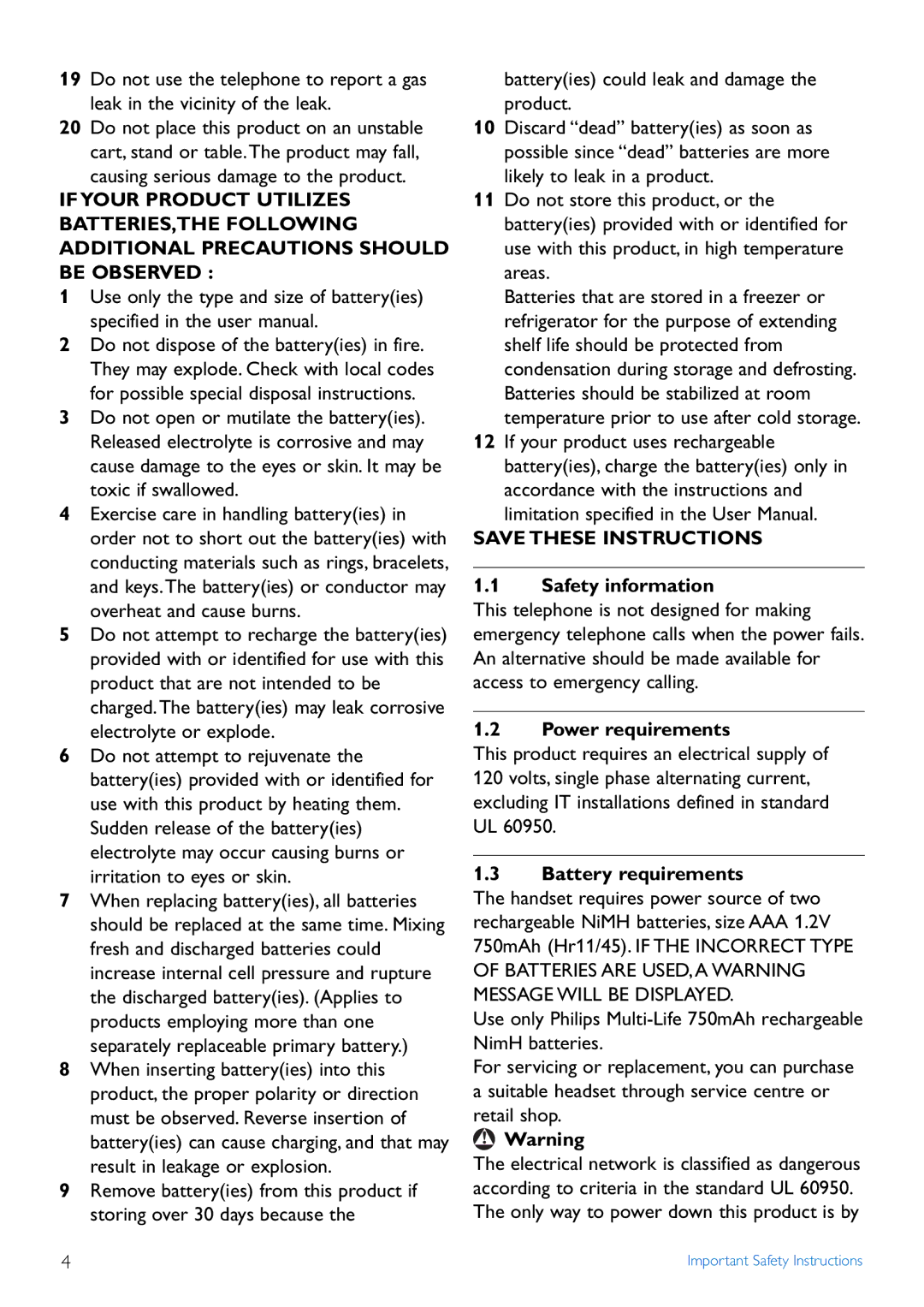
19Do not use the telephone to report a gas leak in the vicinity of the leak.
20Do not place this product on an unstable cart, stand or table.The product may fall,
causing serious damage to the product.
IF YOUR PRODUCT UTILIZES
BATTERIES,THE FOLLOWING ADDITIONAL PRECAUTIONS SHOULD BE OBSERVED :
1Use only the type and size of battery(ies) specified in the user manual.
2Do not dispose of the battery(ies) in fire. They may explode. Check with local codes for possible special disposal instructions.
3Do not open or mutilate the battery(ies). Released electrolyte is corrosive and may cause damage to the eyes or skin. It may be toxic if swallowed.
4Exercise care in handling battery(ies) in order not to short out the battery(ies) with conducting materials such as rings, bracelets, and keys.The battery(ies) or conductor may overheat and cause burns.
5Do not attempt to recharge the battery(ies) provided with or identified for use with this product that are not intended to be charged.The battery(ies) may leak corrosive electrolyte or explode.
6Do not attempt to rejuvenate the battery(ies) provided with or identified for use with this product by heating them. Sudden release of the battery(ies) electrolyte may occur causing burns or irritation to eyes or skin.
7When replacing battery(ies), all batteries should be replaced at the same time. Mixing fresh and discharged batteries could increase internal cell pressure and rupture the discharged battery(ies). (Applies to products employing more than one separately replaceable primary battery.)
8When inserting battery(ies) into this product, the proper polarity or direction must be observed. Reverse insertion of battery(ies) can cause charging, and that may result in leakage or explosion.
9Remove battery(ies) from this product if storing over 30 days because the
battery(ies) could leak and damage the product.
10Discard “dead” battery(ies) as soon as possible since “dead” batteries are more likely to leak in a product.
11Do not store this product, or the battery(ies) provided with or identified for use with this product, in high temperature areas.
Batteries that are stored in a freezer or refrigerator for the purpose of extending shelf life should be protected from condensation during storage and defrosting. Batteries should be stabilized at room temperature prior to use after cold storage.
12If your product uses rechargeable battery(ies), charge the battery(ies) only in accordance with the instructions and limitation specified in the User Manual.
SAVE THESE INSTRUCTIONS
1.1Safety information
This telephone is not designed for making emergency telephone calls when the power fails. An alternative should be made available for access to emergency calling.
1.2Power requirements
This product requires an electrical supply of 120 volts, single phase alternating current, excluding IT installations defined in standard UL 60950.
1.3Battery requirements
The handset requires power source of two rechargeable NiMH batteries, size AAA 1.2V 750mAh (Hr11/45). IF THE INCORRECT TYPE OF BATTERIES ARE USED,A WARNING MESSAGE WILL BE DISPLAYED.
Use only Philips
For servicing or replacement, you can purchase a suitable headset through service centre or retail shop.
!Warning
The electrical network is classified as dangerous according to criteria in the standard UL 60950. The only way to power down this product is by
4 | Important Safety Instructions |
